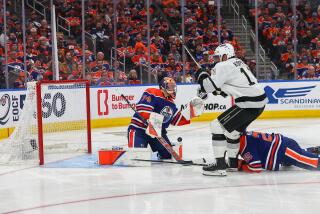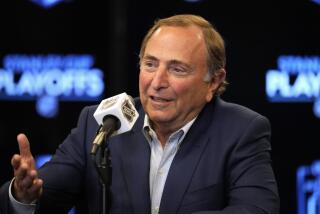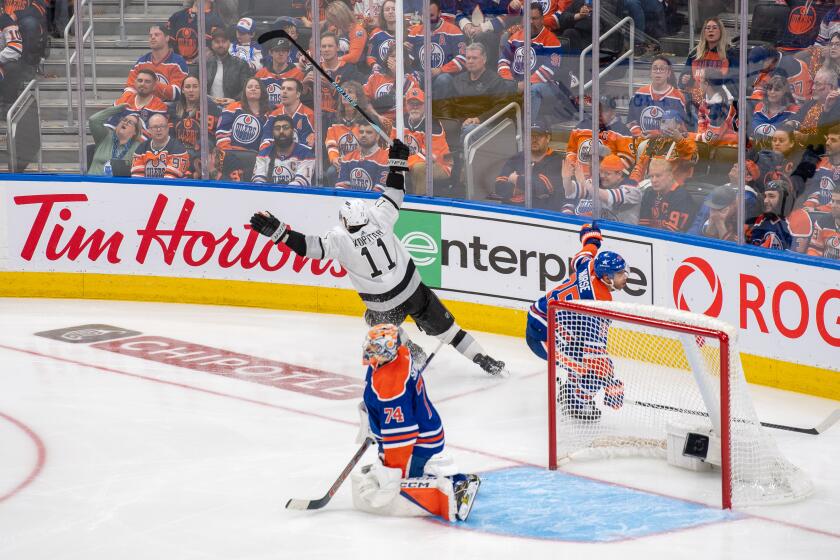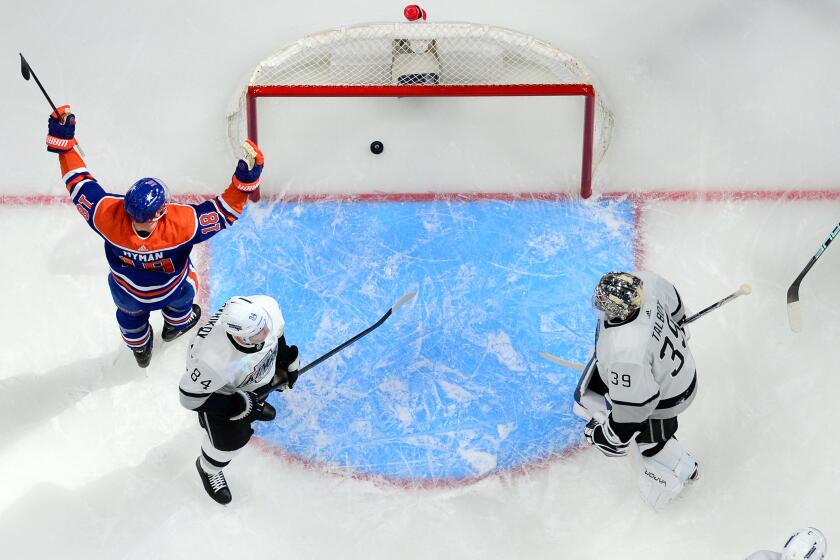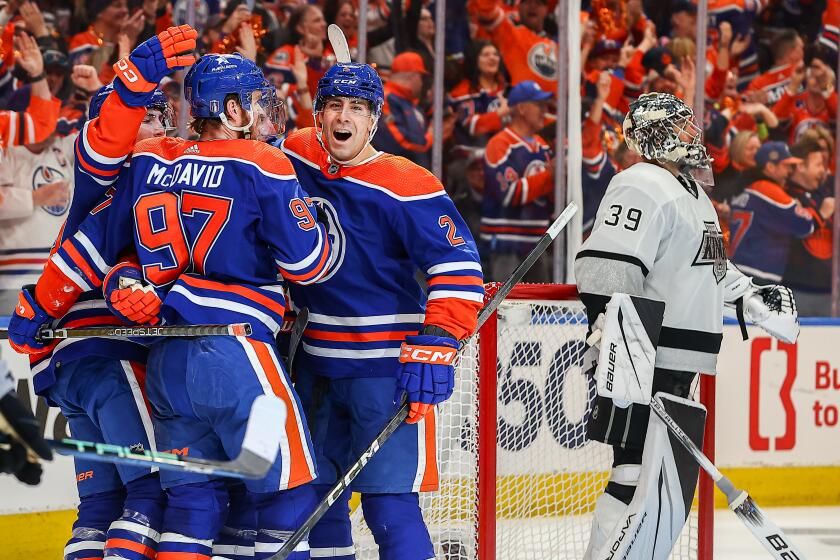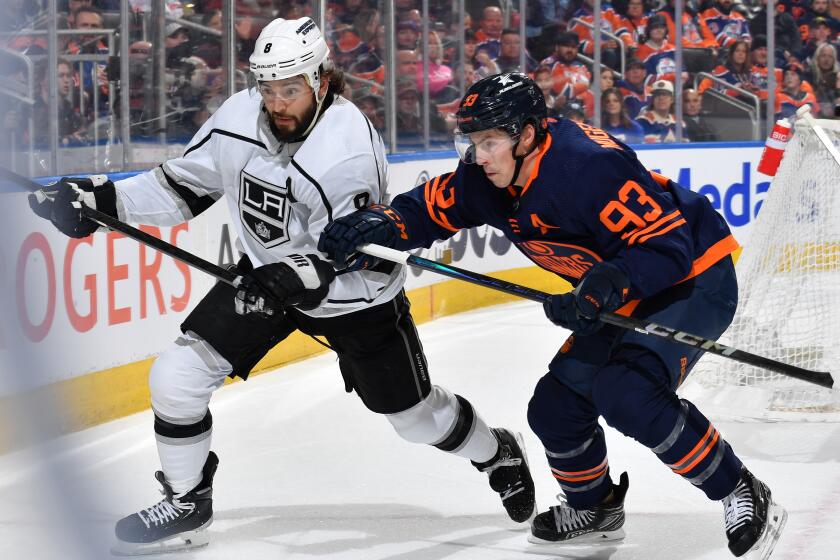Skull bashing? C’mon, use your head
Memo to: NHL players.
From: A lifelong hockey fan.
Subject: Hits to the head.
Please, stop.
Stop and think about the potential consequences the next time you’re tempted to use your elbow to drive the head of an unsuspecting opponent into the glass.
Stop and think what you’re doing before you shove a vulnerable opponent into the boards, causing a collision the human body wasn’t designed to withstand.
Don’t stop being physical. No one wants that.
Just stop the vicious hits to the heads of players who don’t have the puck. Stop the blindside hits.
Stop being stupid.
Or be prepared to watch a teammate or foe carried off the ice on a stretcher, his brain irreparably damaged and his life forever changed by your recklessness.
We’ve seen too many devastating head shots this season. Philadelphia’s Mike Richards on Florida’s David Booth. Pittsburgh’s Matt Cooke on Boston’s Marc Savard. Ducks defenseman James Wisniewski on Chicago defenseman Brent Seabrook on Wednesday.
The first two went unpunished because the NHL had no rule banning hits by one player’s shoulder to another player’s head — a mistake it is slowly amending.
Wisniewski was punished for both the NHL’s appalling failure to discipline Cooke and for his own horrific hit, suspended for eight games without pay at a crucial time for a team fighting the odds in its attempt to earn a playoff spot.
We’ve heard the rationalizations for these hits. Players are bigger and the rinks are not. Dressing in layers of protective equipment from a young age makes players feel immortal. We won’t go into the he-should-keep-his-head-up nonsense because Booth, Savard and Seabrook weren’t even remotely at fault for what happened to them.
For the few players who deliver these kinds of dirty hits, it comes down to respect for one another and yourself.
Are you so desperate to stay employed that you’d disregard the safety of your brethren? It’s not as if your only alternative is working the nickel mines in Sudbury, as it was a few generations ago. More of you have had a college education or are guided by savvy agents and advisors.
Is the motivation to target opponents’ heads coming from general managers? Coaches? Yourselves?
We understand, as fans, that your adrenaline soars during games. We understand that if a skilled player on your team is being slashed and hacked and whacked, you want to protect him and show the other team you won’t stand for that.
That doesn’t give you the right to go after an opponent’s head.
The hit that left Savard with a severe concussion happened a few weeks ago, a day before general managers met in Florida. After years of debates and delays, they could no longer put off addressing this issue, and they proposed a rule that would punish blindside hits to the head. The league set the wheels in motion to impose supplementary discipline for violations this season and to impose penalties next season.
The competition committee, made up of five general managers and five players, must approve the proposal before it goes to the Board of Governors for what’s expected to be unanimous approval. The competition committee has been discussing the league’s proposal and will respond this week, a spokesman for the NHL Players’ Assn. said Monday.
Ottawa’s Jason Spezza, a committee member, told reporters in Montreal on Monday that the issue required “a better solution than just tweaking a little rule. . . . It’s just hard to find the proper language and the right rule.”
Fine. Take your time before crafting a new rule.
Do your due diligence. Consider it carefully. And consider the consequences of not eliminating head shots. The life you endanger could be your own.
Slap shots
Congratulations to center Mitch Wahl of Seal Beach, who was voted to the Western Hockey League’s first All-Star team after a 30-goal, 96-point season for Spokane. Wahl, who played in the California Wave hockey program and one year with the LA Junior Kings, was chosen by the Calgary Flames in the second round of last year’s draft and recently signed an entry-level contract.
Chris Chelios’ NHL comeback hasn’t been the feel-good story he might have hoped. After averaging 13 minutes 40 seconds of ice time in his first three games for the Atlanta Thrashers, the 48-year-old defenseman was scratched the next four games.
twitter.com/helenenothelen
More to Read
Go beyond the scoreboard
Get the latest on L.A.'s teams in the daily Sports Report newsletter.
You may occasionally receive promotional content from the Los Angeles Times.
